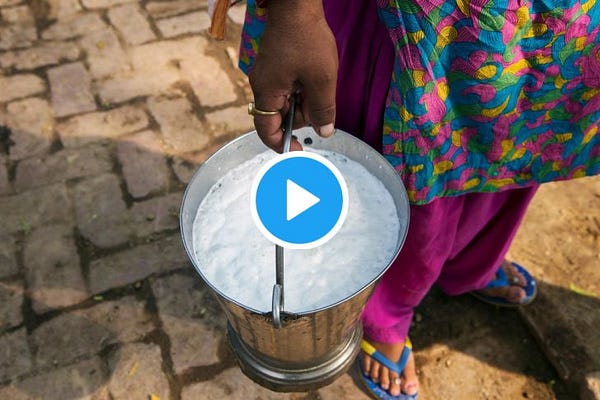Background✨
India’s demand for dairy has been steadily increasing. Milk is the largest and the highest valued crop in India over 6.5 lakh crore, which is the value of wheat and paddy combined.
“India is the world’s largest milk producer, with 22 percent of global production, followed by the United States of America, China, Pakistan and Brazil.”
- FAO (Food and Agriculture Organization of the United Nations)

Problems🤔
Adulteration.


2 out of 3! Sorry to say but we are definitely not drinking pure milk at this point.
Prices for farmers.



Solution👩🔧
Milk-Delivery startups.
They deliver your milk directly from the farms. They do not involve any mediators and ensure that the milk is fresh and unadulterated.
They charge higher than local brands we are accustomed to, but that’s just:

Worth💰

Milk delivery has an addressable market of $1.2 billion of which 8 per cent is online, says a RedSeer report. While milk constitutes over 70 per cent in value terms of an average basket of goods for DailyNinja and Doodhwala, it has gradually come down from 99 per cent to 25 per cent for milkbasket.
Growing Demand🆙


India consumes more milk than it produced. Hence we face the problem of adulteration to meet the demand.
Leading By Country✈


Leading By State🚇


Players🧤
Manufacturers:
These mentioned are some of the few startups trying to change the traditional ways milk reaches to us. The best part? All mentioned above are founded by women! :D
Read about them here.
Aggregators:
Milkbasket
Doodhvale
Country Delight
SuprDaily (Acquired by Swiggy)
Must read: How milktech startups came to spearhead the second wave of hyperlocal daily delivery in India
Note that they are not even close to the offline market, where Amul triumphs over every other dairy company.

Is Growth of Dairy Industry in India Restrictive?💤
The Indian dairy industry is made up of 75 million farmers who own a minimum of 2-3 cows. Most of these farmers are women who sell milk for supporting their families. Further, they don’t easily sell the milk produced to anyone. That is where small companies or producers come into play. They have developed a commercial relationship with the farmers over the years which had helped them to fetch good results. Even big companies like Amul, Nestle, and mother dairy had put a lot of work into this aspect. Hence, building a strong sourcing channel can be a huge problem for any foreign entity and is highly time-consuming.
The Indian milk channels are extremely fragmented than in countries like France and the US. Hence for a new company, it can be hard to approach 100's and 1000's of farmers spread across the nation and convince them.
Then, why not import? That can be a very expensive process. For instance, Danone, a French producer used this method to cover the 1.25 billion milk consumers of our country. They tried to import milk rather getting them locally. The result was, they had to shut their production plant in Haryana.
Most of these foreign companies are forced to focus on specialized nutrition products like baby products and value-added products like flavoured yogurt. Because the liquid milk sector is heavily competitive with local and small producers holding the major portion of the market. Moreover, the Indian population is not ready for adapting towards readymade curd, butter, or yogurt yet. We mostly buy milk and try to make curd or other required products all by ourselves. Though a lot is shifting towards readymade stuff, it might take time.
Apart from that, the Foreign Direct Investment (FDI) in the dairy segment invites a tariff of more than 35% with locals having a tax bracket of 22% plus surcharge and cess. And the Regional Comprehensive Economic Partnership (RCEP) which demanded an FTA agreement with Australia and New Zealand failed various controversies. The Indian government is hesitant and against the plan proposed by the RCEP as an FTA can affect the livelihood of local farmers greatly.
The problems prevailing over cow slaughter is also a major problem for foreign dairy entities. Globally once the cow or buffalo has milked for 14-15 years, they are sold to slaughterhouses. This forms 40-50% of their margin. But in India, a non-producing cow is sent to Kausalya or small farmers at a cheaper price.
Despite all this, companies like Fonterra, Fromageries Bel, Arla, are gauging every aspect of the Indian market intending to set their foot. These companies are either performing a joint venture on investing in foreign entities, like in the case of Danone and Epigamia, Fonterra, and future consumer products. With an expected growth of 13-14% in the next couple of years, the industry is sure a mine of gold waiting to be dug.
Danone: World’s Leading Dairy Brand Failed In India
Danone entered the Indian market in the 1990s and has three failed investments till now. They have officially exited the milk business in 2018.
More on Danone:


Danone decided to re-enter dairy business by investing 182 crores in the local yogurt maker Epigamia. Also, Danone is way older than you think!

Revenues Of The Dominators📈

Amul has hit 52,000-cr this year!
How Are They Different From What’s There Already 🤯
Purity 🥛
The milk-delivery startups promise unadulterated milk, which is pure and bought straight from the farmers to your home.
No Middleman ❌
Having no middleman ensures that the farmers get the best price for their milk.
Self-Test Kits✅
Many milk-deliveries also provide test kits so that you can check whether your milk is unadulterated or not.
Cashbacks💲
You can save a lot while ordering from these apps with the help of cashbacks.
Varieties🍼
They have different types of varieties available and they’ll deliver everything directly on your doorstep.
Scheduled Deliveries🚚
You can manage everything from your app and cancel the orders on whatever day you don’t require milk.
How To Get Started In This Space 👩💻
You can solve the problem of adulterated milk by delivering from your own network and price it in a way where you and your customer both benefit from it.
You can also start by applying for jobs at any of the above-listed players to get an on-hand experience of the industry.
Check This Out: Farmtree by Inhof - Dairy Analytics Platform
“Farmtree is a Dairy Management and Analytics platform developed and designed to track cattle activities and performance. Dairy Management also helps dairy entrepreneurs/farmers to understand the economics of their farm e.g. Per Unit Milk Cost and helps to implement proper farm management.
We are with a vision to digitize the Indian dairy sector which will help Dairy farmers and associates working with these farmers.
Our mission is to implement proper management in Dairy Industry and help farmers to produce cost-effective product, to create awareness and provide a healthy source of milk and dairy products to milk consumer.”
Would They Ever Replace Our Beloved Milkman? 💔
Not just yet. Currently, they haven’t managed to win the hearts of the older generation. Millennials are adapting to the new startups because they are easy and they bring your orders on time + hassle-free. They say the quality is better too.
Also, online takes only about 8% of the milk sales all over India.
Bonus 🎈
White Revolution: The reason why India is no.1 milk producer in the world!


Thank you Dr. Verghese Kurien 🙏
Amul: The Legacy


Links To Read📚
Will Amul’s Milk Run Win India’s Consumption Marathon?
How a handful of FMCG brands continue to dominate market space
Interesting milk industry number and insights
Important!
Show us some love 🥺
Share this with your friends and family! 🥰




